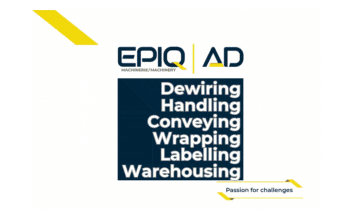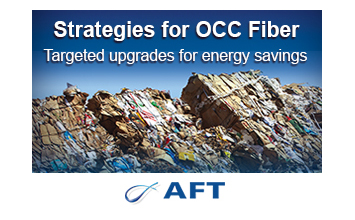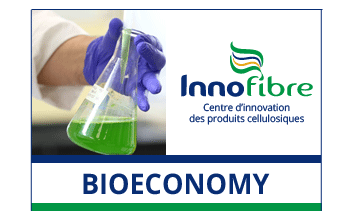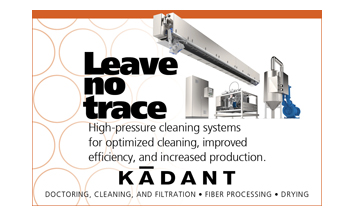March is Women’s History Month in the United States, providing a prime opportunity to celebrate the accomplishments of our female leaders.
In this series, we’re featuring three women who hold leadership positions in our organization. We hope their perspectives will inspire a deeper appreciation of the impact women have in the forest products industry and beyond.
Meet Marie-Noëlle Watts, general manager at Resolute’s Dolbeau (Quebec) paper mill.
What was your path to becoming a leader?
I’ve always been one to take on every challenge that comes my way. That’s why I chose to study chemical engineering; I wanted to solve complex problems and contribute to solutions that benefit the environment. I started my career with Resolute here at the Dolbeau paper mill in 2006 until it was shut down three years later in 2009, and returned in 2012 for the restart of the facility. That’s when I really immersed myself in the production aspect of the operation, which led me to serve as production manager at the Amos and Alma paper mills. I’ve been back at Dolbeau, now at the helm, since August 2021.
What do you enjoy about working in this industry?
When I completed my bachelor’s degree in chemical engineering, pulp and paper wasn’t a popular career choice because of market challenges. The demise of paper had been predicted since the arrival of the internet. I got the bug for this industry a bit by chance. There’s no such thing as routine when you make paper, and our playing field is vast. Every day brings new and exciting challenges. The process is so reactive that you quickly see what works and what doesn’t. My job is super rewarding. Every day I see the results of my work and that of my team. I think papermaking is the most interesting process of all! I take special pride in it.
What are you most proud of regarding the operation or the company?
Any human activity has impacts on the environment. Industrial activities can also involve risks to humans, such as injury, air pollution, noise and greenhouse gas emissions. Regulations govern these activities to eliminate or reduce their impacts. But, above all, it’s up to industry to take responsibility by developing technological and organizational solutions that avoid, reduce or offset such effects. At Resolute Forest Products, we understand this. Productivity is important to the organization, but it will never take precedence over the goal of zero incidents in the area of both safety and the environment. What’s more, transparency is a value that we prioritize in all our activities, whether internal or external. I now understand how essential it is that my personal values and the values of the company where I work be well aligned. That’s where my sense of commitment comes from.
What do you expect from your employees?
The pulp and paper sector produces skilled, motivated, creative workers. Their most crucial attributes are reliability and professionalism. We need all employees to be engaged in their work to ensure the mill runs smoothly so we can deliver on our commitments to our customers and to one another. I also place a high importance on collaboration. When employees work together effectively, they create a positive work environment for everyone. Last but not least, I expect each team member to be proactive about safety and the environment.
How do you keep your team motivated?
I’m a big proponent of intrapreneurship. We all need to fulfill ourselves. To that end, I encourage my people to be assertive and creative and to propose projects and other initiatives. As mill manager, I think a key way of keeping our team motivated is to instill a sense of ownership and pride in our work. I also think the fun quotient is a good indicator of a team’s health. We work very hard in this industry, but to bring laughter into the workplace is still my main motivation when I get up in the morning and go to work.
What challenges did you face as a woman in a traditionally male-dominated industry?
First, women need to stop doubting themselves and refusing promotions that don’t correspond 100% to their expectations. They must also allow themselves to make a few mistakes as they continue to hone their skills. Granted, there are some gender biases in our society, which has long been patriarchal. So even though things are changing and improving, unconscious behaviors often hinder women’s progress.
Each time I joined a new team, it took up to three months for the employees (who tended to be more surprised than resistant) to realize that I was all about doing my job and helping them do theirs, and that I was competent. At every step, I got the job done and was judged solely on my results.
Whom do you look up to for inspiration? Are there women who have mentored you during your career?
I grew up on a dairy farm. Agriculture is also a traditionally male-dominated sector. Women have always been an integral part of it, but they have mostly worked in the background. Our family farm was an industry outlier because it was run mainly by women. My father was a visible minority! I was raised by strong, courageous women who were larger than life and always had solutions – resourceful, brave women who weren’t afraid of anything! It’s safe to say I’m well equipped to face the challenges of our industry!
What advice would you offer women considering careers in forest products?
Women are increasingly gaining influence in the industry, which is a welcome shift. Contrary to what some may think, it’s a really inclusive environment with plenty of room for women who are resourceful and eager to learn. Professionalism ultimately takes precedence over gender. Women considering careers in forest products – or any manufacturing sector – should forge ahead, develop their skills, build strong relationships and embrace the opportunity with confidence.
Favorite cause: Inclusion
One of my sisters was born with a physical disability. I was soon confronted with the obstacles that someone who is different can encounter in our society. We need to promote equality, parity and inclusion in the workplace and in our social initiatives.
Quotation: “When you’re competent and efficient, and when your colleagues can count on you, gender becomes unimportant.”
Source: The Resolute Blog













